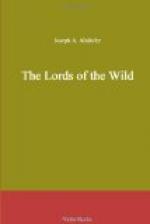Willet and his comrades considered it their duty to stay there also, and wait for Abercrombie, and, the third day after the retreat of St. Luc, Robert and Tayoga went into the woods to see whether Tandakora had turned back again with his warriors. They reckoned that the Ojibway chief’s anger was so strong that he would make another attempt at revenge upon those who had defeated him. There was a rumor that the Indians with the French were becoming much dissatisfied, that they were awed by the reports of the mighty British and American force advancing under Abercrombie, and might leave the French to meet it alone.
“Do you think there is much in these rumors?” asked Robert, as he and the Onondaga went into the forest.
“I do,” replied Tayoga. “The warriors with the French do not like the cannon, and they say the force that is coming against Montcalm is very vast. A great battle may be fought, but Tandakora and his men are not likely to be there. They will go away and await a better day.”
“Then I’m glad they’ll desert for a while. They’re the eyes and ears of the French. That will leave our own scouts and forest runners the lords of the wild, though it seems to me, Tayoga, that you’re the true and veritable lord of the wild.”
“Then if that were so, though you praise my skill too much, Dagaeoga, you and the Great Bear and Black Rifle also are lords of the wild.”
“Lords of the wild! I like the term. It is something to be that at this time and in this region. We’re mainly a wilderness people, Tayoga, and our wars are waged in the woods. We’re not more than two miles from the camp now, and yet we’re completely lost in the forest. There’s not a trace of man. I don’t even see any smoke soiling the sky.”
“It is so, Dagaeoga, and we are again in the shadow of peril. Dangers in the forest are as thick as leaves on the trees. Here is an old trail of our enemies.”
“I’m not interested in old trails. What we’re looking for is new ones.”
“If we keep going toward the north it may be that we will find them, Dagaeoga.”
Several miles farther on they came to other trails which the Onondaga examined with great interest and care. Two or three he pronounced quite recent, but he did not read any particular purpose in them.
“It is likely that they were made by hunters,” he said. “While the armies are gathering, the warriors are sure to seek game. Here two of them passed, and here they stood behind a tree. It is sure now that those two were hunting. I think they stood behind a tree to ambush a deer. The deer was to the west of them. The traces they left in the soft earth under the tree show that the toes of their moccasins pointed toward the west and so they were looking that way, at the deer, which probably stood in the thicket over there nibbling at its food. They must have had an easy shot. Now, we’ll enter the thicket. Lo, Dagaeoga, here is where the deer fell! Look at the little bushes broken and at the dark stain on the ground where its life flowed out. They dragged the body to the other side of the thicket, and cut it up there. Nothing could be plainer, the traces are so numerous. They were casual hunters, and it is not worth our while to follow them.”




